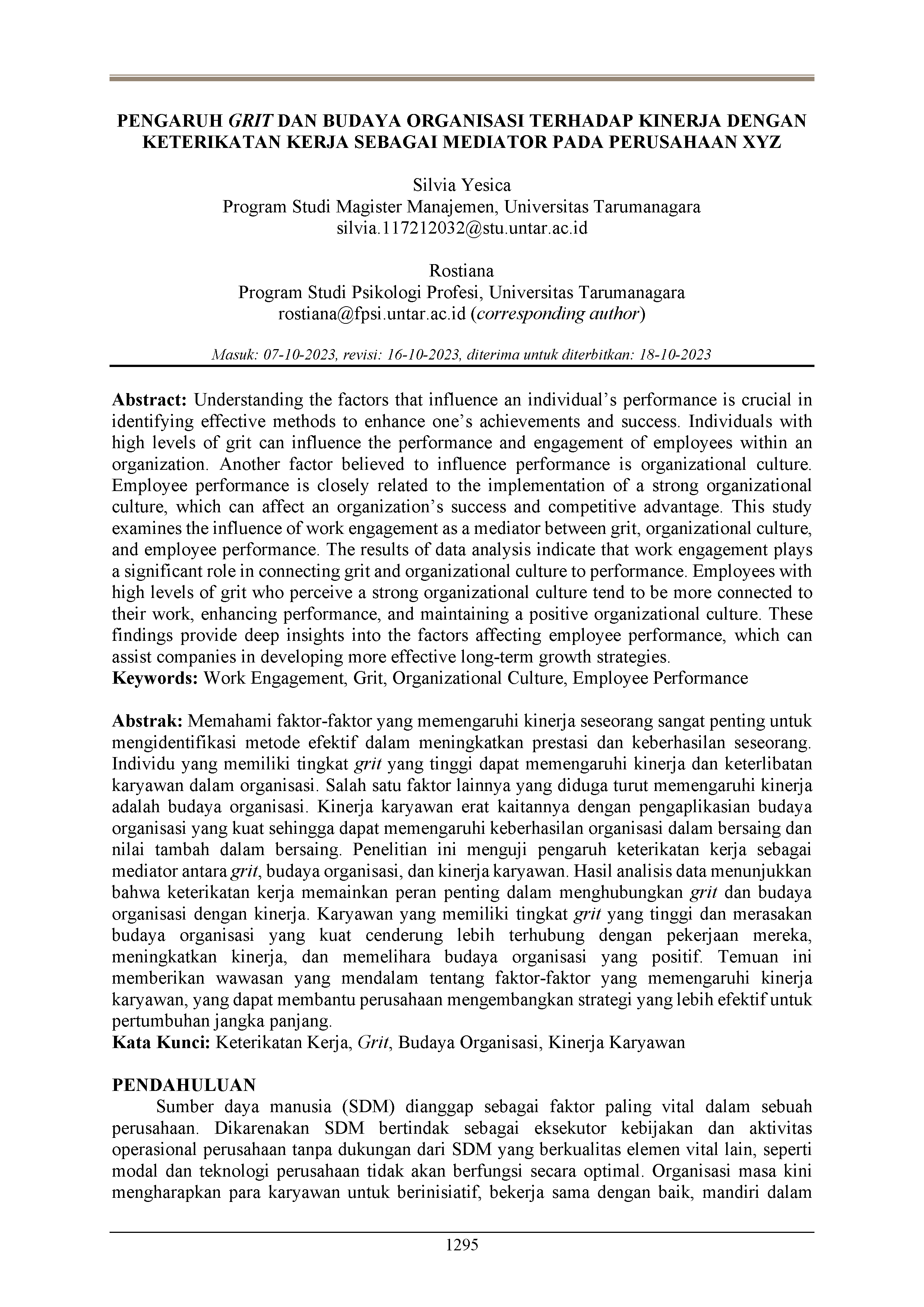Pengaruh grit dan budaya organisasi terhadap kinerja dengan keterikatan kerja sebagai mediator pada perusahaan XYZ
Main Article Content
Abstract
Understanding the factors that influence an individual’s performance is crucial in identifying effective methods to enhance one’s achievements and success. Individuals with high levels of grit can influence the performance and engagement of employees within an organization. Another factor believed to influence performance is organizational culture. Employee performance is closely related to the implementation of a strong organizational culture, which can affect an organization’s success and competitive advantage. This study examines the influence of work engagement as a mediator between grit, organizational culture, and employee performance. The results of data analysis indicate that work engagement plays a significant role in connecting grit and organizational culture to performance. Employees with high levels of grit who perceive a strong organizational culture tend to be more connected to their work, enhancing performance, and maintaining a positive organizational culture. These findings provide deep insights into the factors affecting employee performance, which can assist companies in developing more effective long-term growth strategies.
Memahami faktor-faktor yang memengaruhi kinerja seseorang sangat penting untuk mengidentifikasi metode efektif dalam meningkatkan prestasi dan keberhasilan seseorang. Individu yang memiliki tingkat grit yang tinggi dapat memengaruhi kinerja dan keterlibatan karyawan dalam organisasi. Salah satu faktor lainnya yang diduga turut memengaruhi kinerja adalah budaya organisasi. Kinerja karyawan erat kaitannya dengan pengaplikasian budaya organisasi yang kuat sehingga dapat memengaruhi keberhasilan organisasi dalam bersaing dan nilai tambah dalam bersaing. Penelitian ini menguji pengaruh keterikatan kerja sebagai mediator antara grit, budaya organisasi, dan kinerja karyawan. Hasil analisis data menunjukkan bahwa keterikatan kerja memainkan peran penting dalam menghubungkan grit dan budaya organisasi dengan kinerja. Karyawan yang memiliki tingkat grit yang tinggi dan merasakan budaya organisasi yang kuat cenderung lebih terhubung dengan pekerjaan mereka, meningkatkan kinerja, dan memelihara budaya organisasi yang positif. Temuan ini memberikan wawasan yang mendalam tentang faktor-faktor yang memengaruhi kinerja karyawan, yang dapat membantu perusahaan mengembangkan strategi yang lebih efektif untuk pertumbuhan jangka panjang.
Article Details

This work is licensed under a Creative Commons Attribution-NonCommercial-ShareAlike 4.0 International License.
This work is licensed under a Jurnal Manajemen Bisnis dan Kewirausahaan Creative Commons Attribution-ShareAlike 4.0 International License.
References
Bakker, A. B. (2011). An evidence-based model of work engagement. Current Directions in Psychological Science, 20(4), 265–269. https://doi.org/10.1177/0963721411414534
Bakker, A. B., & Demerouti, E. (2008). Towards a model of work engagement. Career Development International, 13(3), 209–223. https://doi.org/10.1108/13620430810870476
Campbell, J. P. (1990). Modeling the performance prediction problem in industrial and organizational psychology. In M. D. Dunnette & L. M. Hough (Eds.), Handbook of industrial and organizational psychology (pp. 687–732). Consulting Psychologists Press.
Cappelli, P., & Tavis, A. (2016, October). The performance management revolution. Harvard Business Review. https://hbr.org/2016/10/the-performance-management-revolution
Denison, D. R., & Mishra, A. K. (1995). Toward a theory of organizational culture and effectiveness. Organization Science, 6(2), 204–223. https://doi.org/10.1287/orsc.6.2.204
Duckworth, A. L., Peterson, C., Matthews, M. D., & Kelly, D. R. (2007). Grit: Perseverance and passion for long-term goals. Journal of Personality and Social Psychology, 92(6), 1087–1101. https://doi.org/10.1037/0022-3514.92.6.1087
Duckworth, A. L., & Seligman, M. E. P. (2005). Self-discipline outdoes IQ in predicting academic performance of adolescents. Psychological Science, 16(12), 939–944. https://doi.org/10.1111/j.1467-9280.2005.01641.x
Eskreis-Winkler, L., Shulman, E. P., Beal, S. A., & Duckworth, A. L. (2014). The grit effect: Predicting retention in the military, the workplace, school and marriage. Frontiers in Psychology, 5. https://doi.org/10.3389/fpsyg.2014.00036
Heskett, J. L., Jones, T. O., Loveman, G. W., Sasser, Jr., W. E., & Schlesinger, L. A. (2008). Putting the service-profit chain to work. Harvard Business Review. https://hbr.org/2008/07/putting-the-service-profit-chain-to-work
Igbaria, M., Zinatelli, N., Cragg, P., & Cavaye, A. L. M. (1997). Personal computing acceptance factors in small firms: A structural equation model. MIS Quarterly: Management Information Systems, 21(3), 279–301. https://doi.org/10.2307/249498
Koopmans, L., Bernaards, C. M., Hildebrandt, V. H., Schaufeli, W. B., De Vet Henrica, C. W., & Van Der Beek, A. J. (2011). Conceptual frameworks of individual work performance: A systematic review. Journal of Occupational and Environmental Medicine, 53(8), 856–866. https://doi.org/10.1097/JOM.0b013e318226a763
Schaufeli, W. B., & Bakker, A. B. (2004). Job demands, job resources, and their relationship with burnout and engagement: A multi-sample study. Journal of Organizational Behavior, 25(3), 293–315. https://doi.org/10.1002/job.248
Towers Watson. (2014). Global talent management and rewards study. https://middleeast-business.com/wp-content/uploads/2015/01/Towers-Watson_Global-Talent-Man_Rewards-Study_August-2014-1-1.pdf


